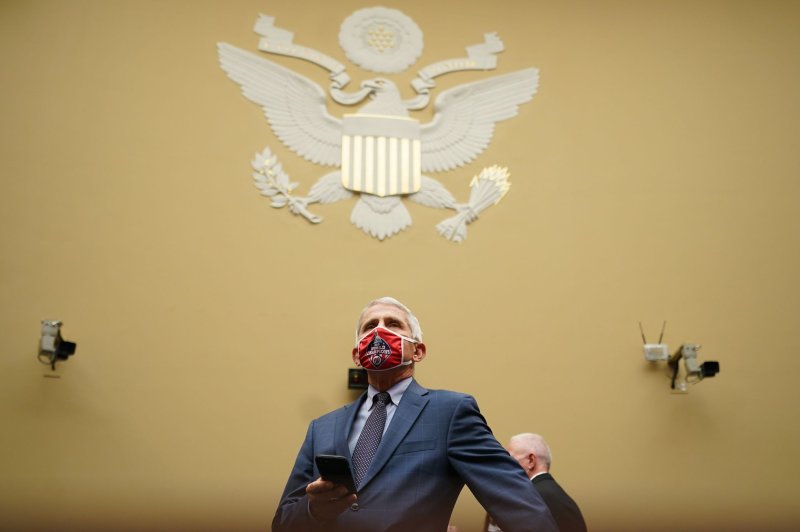1 of 5 | Dr. Anthony Fauci told lawmakers last month that the federal government is "not in total control" of the coronavirus outbreak. Photo by Kevin Dietsch/UPI |
License Photo
July 31 (UPI) -- Dr. Anthony Fauci, the United States' top expert on infectious diseases, expressed "cautious" optimism in Congress Friday that a safe and effective vaccine against COVID-19 will available this fall or early winter.
Fauci, director of the National Institute of Allergy and Infectious Diseases and a member of the White House Coronavirus Task Force, testified in the House that a vaccine could be developed by the end of the year.
Fauci cited a 30,000-patient clinical trial by Moderna that began Monday.
"We are cautiously optimistic that this will be successful," he said of Moderna's mRNA-1273 candidate.
Fauci said his optimism is based on results from earlier phases of the Moderna trial that "clearly showed that individuals who were vaccinated mounted a neutralizing antibody response that was at least comparable, and in many respects, than what we see in convalescent [blood] serum."
Fauci said earlier this week that parts of the United States can't afford another surge of cases.
Centers for Disease Control and Prevention Director and Dr. Robert Redfield and Adm. Brett Giroir, assistant secretary of the Department of Health and Human Services, also appeared Friday before the House oversight committee's coronavirus subcommittee.
The hearing is titled, "The Urgent Need For A National Plan To Contain The Coronavirus."
All three health officials testified in the Senate a month ago, during which Fauci told lawmakers that the federal government is "not in total control" of the outbreak and warned U.S. cases could ultimately reach 100,000 per day.
Fauci told lawmakers Friday that any new coronavirus vaccine may not be available to all Americans immediately, but instead could be rolled out in phases.
"That's the reason why we have the committees to do the prioritization of who should get it first," he said. "But ultimately, within a reasonable period of time, the plans now allow for any American who needs a vaccine to get it within the year 2021."
Redfield, meanwhile, urged that schools be reopened for in-person classes this fall, saying a return to face-to-face learning is in the best interests of children's health.
"There's really very significant public health consequences of the school closure," he said, citing student access to mental health services and nutritional support.
Under questioning from Rep. Maxine Waters, D-Calif., Redfield testified that he was not told in advance of a new rule requiring hospitals to shift reporting their daily data on COVID-19 hospitalizations directly to the Trump administration, rather than to the CDC.
This month's move sparked concerns among state governors and healthcare providers and led some Democrats to fear the White House could politicize or withhold the data -- an accusation denied by the administration.
"We weren't directly involved in the final decision," Redfield said, adding that while he was told the decision was made by HHS Secretary Alex Azar, he did not directly speak to him or to Vice President Mike Pence about the move.
He did testify, however, that the CDC "worked in cooperation" with others in the administration to make the change, which HHS officials asserted was necessary to speed up the reporting process.
The hearing was originally scheduled for July 21 but was postponed after Trump administration officials declined to make Fauci and several other potential witnesses available, subcommittee chairman Rep. James Clyburn, D-S.C., said in a letter this month to Pence and Azar.
Clyburn unsuccessfully sought documents detailing demand and supply for testing, contact tracing and other pandemic countermeasures after President Donald Trump said last month that increased testing is a "double-edged sword" and said he'd asked his "people" to slow COVID-19 testing.
The South Carolina Democrat said he was told by the White House that Azar was "unavailable to testify" earlier because he was "busy on the ground" addressing the pandemic. Azar hasn't testified in Congress since February -- about a month before Trump declared a national health emergency.
Earlier Friday, Sanofi and GSK announced that they will receive as much as $2.1 billion in U.S. funding to develop their vaccine candidate.















